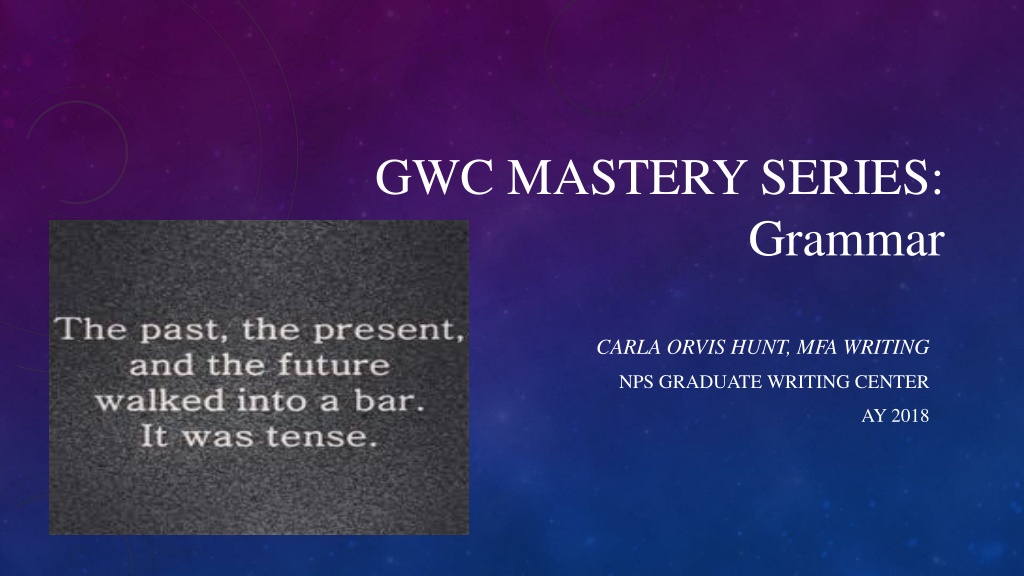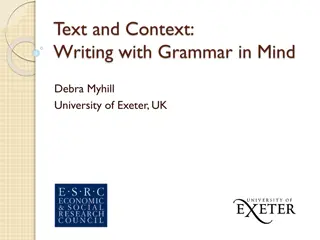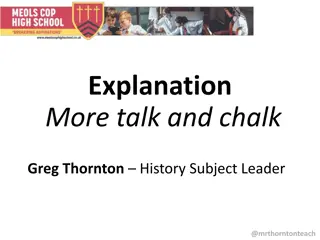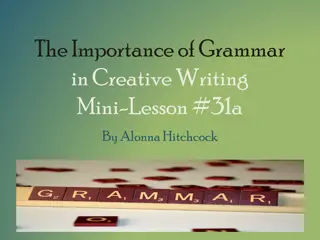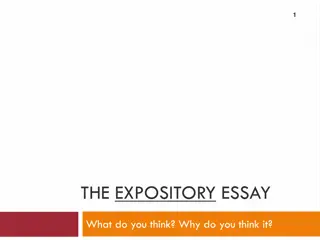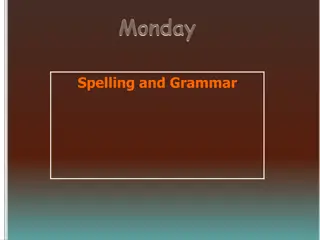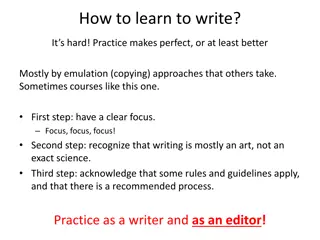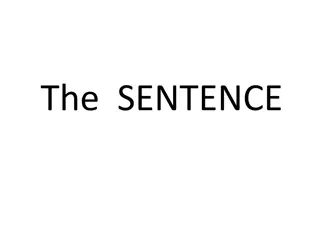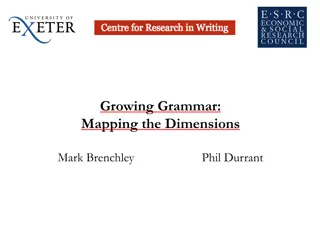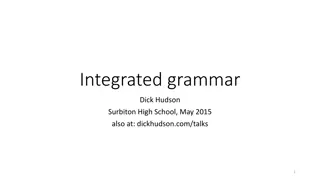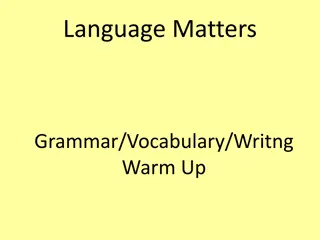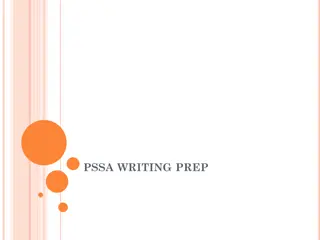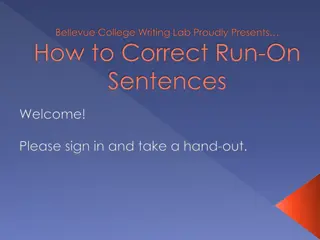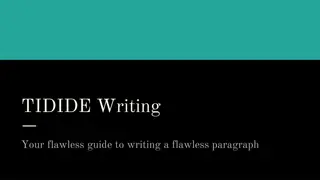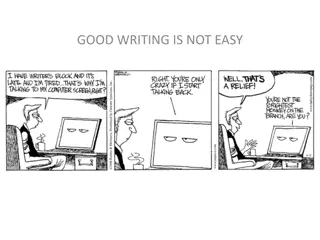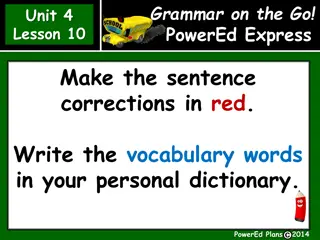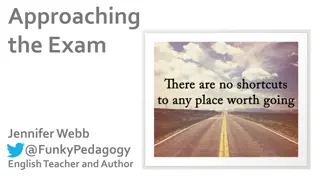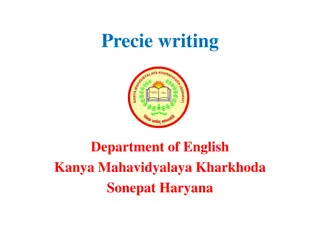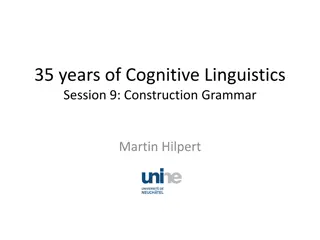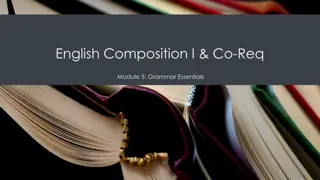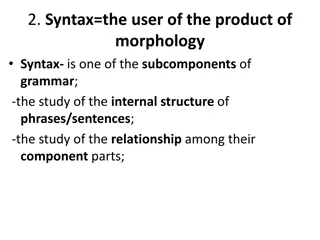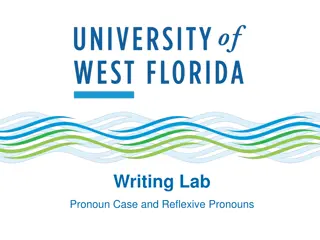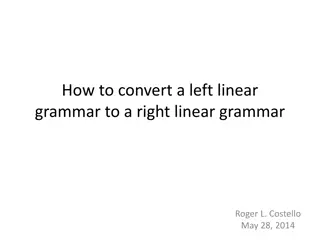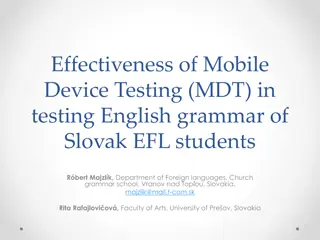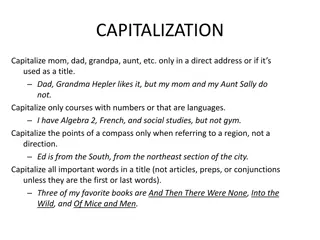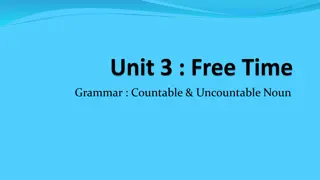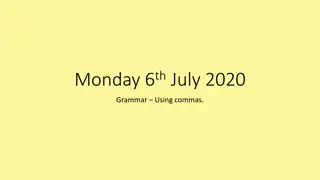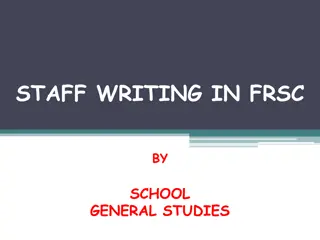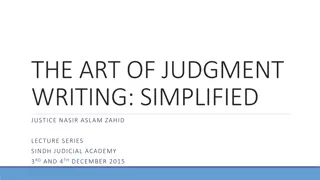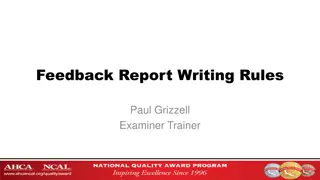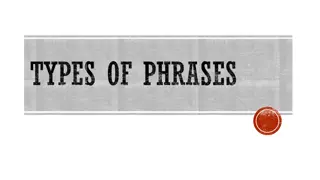Mastering Grammar for Clear and Concise Writing
Explore the importance of grammar in structuring language and creating clear, concise writing. Learn tips like proper article usage and sentence structure to enhance the connectedness of your ideas. Improve your writing skills with the mastery series on grammar fundamentals.
Download Presentation

Please find below an Image/Link to download the presentation.
The content on the website is provided AS IS for your information and personal use only. It may not be sold, licensed, or shared on other websites without obtaining consent from the author. Download presentation by click this link. If you encounter any issues during the download, it is possible that the publisher has removed the file from their server.
E N D
Presentation Transcript
GWC MASTERY SERIES: Grammar CARLA ORVIS HUNT, MFA WRITING NPS GRADUATE WRITING CENTER AY 2018
BREAKING GRAMMAR RULES QUICK CHECK: Solid or Rule-Breaker (RB)? I walked all way to Santa Cruz. RB! Try: I walked all the way to Santa Cruz. Article usage Solid or Rule-Breaker (RB)? For who am I holding this glass of wine? RB! Try: For whom am I holding this glass of wine? Pronoun use Solid or Rule-Breaker (RB)? I cut down only the trees, which were marked with yellow ribbons. RB! Try: I cut down only the trees that were marked with yellow ribbons. Pronoun use
Grammar describes the structure of language. Just as we like clear roads on which to drive, readers enjoy a clear path to follow as they absorb your argument. That clear path starts with the heart of grammar: clear sentence structure.
Bottom Line up Front (BLUF): Your writing goal is to produce several clear, concise sentences that demonstrate the connectedness of your ideas. Sentences depend on: words (which convey meaning) and punctuation (which work as road signs). Mastery Series: Grammar sets the stage for success by covering how types of words interact in order to build proper sentences. WORKSHOP ROADMAP SUPPORTING ACTORS ACTORS ACTIONS CONNECTORS AND CONNECTION: SENTENCE FORM
You no more need to know all the grammar terms in order to write than I need to know exactly how every single car engine part works in order to drive my car. However, understanding how a few key elements work (and keeping printed copies of lists of those terms) can really help your writing. I have included the lists that seem to help NPS students the most as individual slides.
#1: SUPPORTING ACTORS ARTICLE USAGE WHAT DO ARTICLES DO? Articles signal whether a noun has a general or specific connotation. The is a definite article (the cat) meaning a specific cat; a/an are indefinite articles (a cat) meaning any cat. Go find a cat! differs from Go find the cat! WHERE DO I PUT AN ARTICLE? Generally, you can insert articles the, a, or an before a noun when no other modifiers are present: the cat or before already present modifiers: the big, black cat.
SPECIFICALLY, USE A, AN, or THE WHEN: You need to classify or define a noun. The chapter introduces a market economy for Alaska. After the first mention of something general when referring back Improvements are possible within the market economy. The improvements include:
EXCEPTIONS (MEANING, DO NOT USE AN ARTICLE WHEN): Speaking generally I love cheese. I m terrified of heights. Before plural nouns when speaking generally Improvements are possible within democracy. Trouble with when to use/not use an article? Listen attentively to your favorite podcasts/ radio shows. Before countries, towns, streets, languages and single mountains: I am from China. She speaks Arabic. The boy climbed Mt. Everest. Before some places and with some forms of transport: I live at home. I came here by car.
(See in-class handout and answer key) Article Usage Exercises Solid or R-B? Why did cat cross the road? RB! the cat Solid or R-B? Why did Cat cross the road? Solid! Solid or R-B? Why did the cat cross the road? Solid! Solid or R-B? The cats crossed the road. Solid! Solid or R-B? None of the cats crossed the road. Solid!
Modifierseither words or phrasesshould provide more information about a subject or object within a sentence. A dangling modifier implies but does not name the subject or the object.
(See in-class handout and answer key) Dangling Modifier Exercises Solid or R-B? Having finished my dinner, the waitress offered to bring out the dessert tray. Solid or R-B? Without knowing his name, it was hard to introduce him. Solid or R-B? A cop just knocked on my door and said my dogs were chasing people on bikes. Solid or R-B? The park ranger spotted a beaver peering through his binoculars.
(See in-class handout and answer key) Solid or R-B? Having finished my dinner, the waitress offered to bring out the dessert tray. Try: Once I finished my dinner, the waitress offered to bring out the dessert tray. Solid or R-B? Without knowing his name, it was hard to introduce him. Try: It was hard to introduce him without knowing his name. Solid or R-B? A cop just knocked on my door and said my dogs were chasing people on bikes. Try: A cop just knocked on my door and said my dogs were chasing people that were on bikes. Solid or R-B? The park ranger spotted a beaver peering through his binoculars. Try: Peering through his binoculars, the park ranger spotted a beaver.
WORDS PARTY IN EITHER PHRASES OR CLAUSES! CLAUSES Two+ WITH both a subject and a verb -Amphibious warfare will end on Tuesday. -When amphibious warfare ends PHRASES Two+ words WITHOUT both a subject and a verb -amphibious warfare -on Tuesday
Phrase Examples on Tuesday in front of base as a matter of fact amphibious warfare is analyzing
A PREPOSITION TELLS A READER WHEN AND WHERE SOMETHING OCCURRED AS WELL AS HOW IT OCCURRED.
LIST OF COMMON PREPOSITIONS about below for to above beneath from toward(s) across behind in under after beside(s) into underneath against between like until along beyond of unto amid but (except) off up among by on upon around concerning over with as down past within at during since without before except through(out)
Prepositions are easily confused because many have nuanced meanings. Use the following tips adapted from www.grammar.net/prepositions to prevent confusion and to promote clarity: Use at to identify where an object or subject is; use to for other locations. The book is at home. I walked to the beach. Use for to measure periods of time; use since to reference a past event. Walking for hours made me thirsty. Since 1979, I have loved to walk. Use in and for to indicate general measurements (and yes, time is a measurement); use on and at to indicate specific dates or times. - We measure in inches. We walked for hours. We finish studying in minutes. - We complete the measurements on time. We walk on Tuesday. We finish studying at 1900. Use about and around to estimate quantities. I need about a cup of sugar. You will probably need around an hour to jog. Use in when referring to geographical locations. I particularly like to walk in Paris. I like to drink coffee in the cafes, also. Use on when referring to road or street names. My favorite caf is on Lighthouse Avenue.
(See in-class handout and answer key) Preposition Exercises Solid or RB? Jim has worked at NPS for 20 years. Solid or RB? She arrived at base around 4 p.m. Avoid stacking multiple prepositional phrases in a row. See Building Better Sentences for more. Solid or RB? Apartments in Monterey are expensive. Solid or RB? The blue areas on the map indicate water. Solid or RB? I met the nicest people at Monterey, California. Solid or RB? I met the nicest people at the Trident Room in Monterey.
#2 ACTORS: SENTENCE SUBJECTS are usually nouns or pronouns, but sometimes other parts of speech acting as nouns. You can find sentence subjects by asking who or what is doing the action, hence the actor. *Nouns: person, place, or thing George wonders why he cannot find coffee. Peace is the ultimate goal. Abstract nouns are concepts like freedom, prejudice, and democracy. Confused about when to capitalize a noun? Come to Mastery Series: Clarity and Concision.
A few examples of other parts of speech acting as the sentence subject Gerunds: verb ending in ing Traveling creates new thoughts. Adverb as a subject: Happily is an adverb. Adjective then a pronoun as subjects: Beauty is truly soul deep; that is, it comes from the soul.
ACTORS: PRONOUNS CAN BE SENTENCE SUBJECTS Pronouns replace nouns. The fishermen complained about the weather forecast. They said it had not warned them of the mudslide. What is the other pronoun above? You guessed it!
PRONOUNS ARE GOOD TO KNOW IN OTHER SITUATIONS, TOO. Reflexive/ Intensive Pronouns George hurt himself. George himself was not hurt. Personal Pronouns Possessive Pronouns (DO NOT NEED AN APOSTROPHE) Relative Pronouns (used to introduce a modifier) Interrogative Pronouns (used in questions) Who goes there? Demonstrative Pronouns (used to point out people or things) that person Indefinite Pronouns Indefinite Pronouns (cont.) I hers herself that what that all many he his himself what which this another most her its itself which who these any neither him my myself who whom those anybody nobody it mine ourselves whom whose anyone none she our themselves whose both no one they ours yourself each one them their either other us theirs everybody several we your everyone some(body) (one) you yours few such
TRICKY PRONOUN EXERCISES (See in-class handout) Which is correct? The teacher chased it s tail. The teacher chased its tail. Which is a better use of which? I cut down all the trees, which gave the family lots of firewood for the winter. I cut down only the trees, which were marked with yellow ribbons. Which is a better use of that? I phoned everyone I knew that was in the fire area. I phoned everyone I knew that made me feel a lot better. Which is a better use of who rather than whom? Who lives there? For who am I holding this glass of wine? Its = possessive pronoun It s = contraction of it is That/ which: In these cases, use that when what comes after modifies what came before. Use which (with a preceding comma) when what comes after could be cut without altering the meaning of the sentence. We need that but which is optional. Use who when referring to the subject of a sentence, whom when referring to the object. *Tip: when you can replace it with he or she, use who. When you can replace it with him or her, use whom.
#3 ACTIONS: VERBS English hinges on the energy of its verbs. Verbs either state action Hank sneezes. Jim studies. Jane throws a baseball. Google active verbs to find lists upon lists of energetic verbs. Explode! Optimize! De-segregate! Another TIP Come to Building Better Sentences to find ways to replace forms of to be, like is, was, were, as your go-to verbs. or define a state of being. Carla feels great. Tim is comfortable in his new graduate program.
SUBJECTS AND VERBS NEED TO AGREE I WALK YOU WALK SHE, HE, IT, SARAH, CHINA = WALKS WE WALK THEY WALK I AM YOU ARE SHE, HE, IT, SARAH, CHINA = IS WE ARE THEY ARE To be, to have, and to do are the three main irregular verbs.
(See in-class handout and answer key) Subject / Verb Agreement Exercises SOLID or RB? I walks to the store. Everyone walks to the store. James and his friend walks to the store. China walk to the store. The United States walks to the store. Five minutes are a lot of time. Five minutes is a lot of time. The crowd roars as the musicians come on stage. The crowd roar as the musicians come on stage.
Stay consistent with your verb tense and a TIP Changing verb tense with no reason will confuse your reader. It s fine to change if there is a reason. Yesterday, I ran. Today, I jog. Tomorrow, I will fly. You don t need future tense when writing your papers/ thesis (this chapter will analyze) except when doing a proposal. Change this paper will analyze to this paper analyzes.
#4 CONNECTION AND CONNECTORS: SENTENCE FORM Subject = Actor Verb = Action (Object = what s acted upon)
CLAUSES THE BEST KEY TO UNDERSTANDING GRAMMATICALLY CORRECT SENTENCES CLAUSE group of two or more words with both subject and verb TWO TYPES OF CLAUSES DEPENDENT CLAUSE (DC) Like a dependent person, a DC cannot stand on its own. INDEPENDENT CLAUSE (IC) Like an independent person, an IC can stand on its own.)
A SIMPLE SENTENCE IS ONE INDEPENDENT CLAUSE IC. I walk. She walks to the store. The United States Navy optimizes defense. The United States Navy and the Marine Corps work together and find ways to optimize defense. Note: Word or phrase, IC = still all one IC Tomorrow, I walk to the store. In the heat of the moment, she exercises patience.
CONNECTOR OF IDEAS: CONJUNCTIVE ADVERBS Not a tropical disease!! Unfortunately, I ran to the store. Luckily, they had cakes. Subsequently, I ate cakes.
CONNECTOR OF IDEAS: CONJUNCTIVE ADVERBS Accordingly Similarly Simultaneously Specifically Still Subsequently Then Therefore Thus (no comma needed) Ultimately Hence (no comma needed) Henceforth However Incidentally Indeed Instead Likewise Meanwhile Moreover Namely Nevertheless Next Nonetheless Now (no comma needed) Otherwise Additionally Also Alternatively Anyway Besides Certainly Consequently Conversely Contrarily Elsewhere Finally Furthermore
What if I want to combine two ICs? TWO WAYS TO DO SO: 1) Use a comma and a FANBOY (coordinating conjunction). I walk to the store, and it rains. 2) Use a semi-colon (be sure what comes on either side can stand alone). I walk to the store; it starts raining. You can also add a word (like a not a disease!), phrase, or dependent clause after the semi-colon to clarify the connection. I walk to the store; unfortunately, it starts raining.
RUN-ON SENTENCES While Mastery Series: Punctuation teaches more about proper punctuation, please note that these three ways of connecting two ICs are incorrect and known as run-on sentences: I walk, it rains. I walk it rains. I walk and it rains. CORRECT WAYS TO CONNECT TWO ICs I walk. It rains. I walk, and it rains. I walk; it rains.
REMEMBER DEPENDENT CLAUSES? They cannot stand on their own. A dependent clause alone is a sentence fragment. When I walk to the store because Jane sprinted down the hill after the Admiral wrote his article although the student completed her thesis whatever you might think
CONNECTORS: DEPENDENT MARKER WORDS (a.k.a. subordinating conjunctions) After Since Although Though As Unless As if Until Because Whatever Before When Even if Whenever Even though Whether If While In order to Whereas
What if I want to use a DC? How can I combine it with an IC? DC, IC. When I woke up today, I smelled coffee. Because we signed the treaty, peace lasted for 1400 years. IC DC. (no comma) I smelled coffee when I woke up today. Peace lasted for 1400 years because we signed the treaty. *Decide which to use by what comes before and after.
QUICK SENTENCE DIAGNOSTIC (See in class handout and answer key) 1. *When you drive a car you must carry liability insurance, which pays for any damage or injury that you may inflict on others. 2. *Insurance in some places is cheaper, than it is in others. 3. *How much insurance costs depends on how congested traffic is in the area. 4. *If you live in a rural community, you probably pay much less than you would, if you lived in a city. 5. *An unmarried male who is under twenty-five pays the highest premium, because statistics show that he is the worst risk. 6. *Drivers who have a record of accidents must also pay a high premium; since they have cost their insurance companies a great deal of money. 7. If you are properly insured it is a very good idea to drive to and around Lake Tahoe. 8. I particularly recommend the East shore of Lake Tahoe but if you are going during Winter then you might prefer Kirkwood and the West shore.
